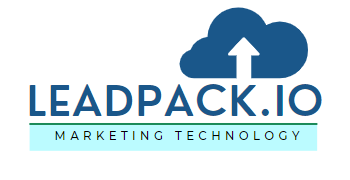Recent Posts

5 Marketing Strategies Powered by Technology to Accelerate Your Business Growth
"To be successful, you have to have your heart in your business, and your business in your heart."
– Thomas Watson, Sr., former CEO, IBM
5 Marketing Strategies Powered by Technology to Accelerate Your Business Growth
Introduction:
In today's digital age, marketing plays a critical role in the success of any business. As more consumers turn to the internet to find products and services, businesses need to adapt their marketing strategies to stay competitive. Fortunately, technology has made it easier than ever to connect with potential customers and grow your business. In this post, we'll explore 5 marketing strategies that are empowered by technology and can help accelerate your business growth.
Strategy #1: Data-Driven Marketing
Data-driven marketing is a strategy that involves using data to inform marketing decisions. By collecting and analyzing data, businesses can gain insights into their target audience, understand their behavior and preferences, and tailor their marketing efforts accordingly. Technology plays a critical role in enabling data-driven marketing by providing tools to collect, store, and analyze data.
One example of such a tool is Google Analytics, which provides businesses with insights into their website traffic, audience demographics, and user behavior. Google Analytics helps businesses track the effectiveness of their marketing campaigns, identify areas for improvement, and optimize their website for better user experience.
Keywords: data-driven marketing, Google Analytics, website traffic, audience demographics, user behavior, marketing campaigns
Strategy #2: Personalization
Personalization is a marketing strategy that involves tailoring content and messaging to individual users based on their preferences and behavior. By personalizing marketing efforts, businesses can increase engagement, build customer loyalty, and ultimately drive sales. Technology plays a critical role in enabling personalization at scale, by providing tools to collect and analyze data, and automate personalized messaging.
One example of a tool that enables personalization is email marketing software, such as Mailchimp or Constant Contact. These tools allow businesses to segment their email lists based on user behavior and preferences, and send personalized messages to each segment. By personalizing email messages, businesses can increase open rates, click-through rates, and ultimately drive more sales.
Keywords: personalization, email marketing, user behavior, preferences, email lists, segmentation
Strategy #3: Social Media Marketing
Social media marketing is a strategy that involves using social media platforms to reach and engage with potential customers. By creating content and messaging that resonates with their target audience, businesses can build brand awareness, generate leads, and drive sales. Technology plays a critical role in optimizing social media marketing efforts by providing tools to automate posting, analyze engagement, and optimize content.
One example of a tool that enables social media marketing is Hootsuite, which allows businesses to schedule social media posts, monitor engagement, and track social media performance. Hootsuite also provides insights into audience demographics and engagement, which can help businesses refine their social media strategy.
Keywords: social media marketing, social media platforms, brand awareness, lead generation, Hootsuite, audience demographics
Strategy #4: Content Marketing
Content marketing is a strategy that involves creating and distributing high-quality content that resonates with your target audience. By creating valuable and engaging content, businesses can build brand authority, drive traffic to their website, and generate leads. Technology plays a critical role in enabling content marketing by providing tools to create, distribute, and analyze content.
One example of a tool that enables content marketing is HubSpot, which provides businesses with a suite of tools to create, distribute, and analyze content. HubSpot's content creation tools include a blog editor, landing page builder, and email marketing software. By using these tools, businesses can create and distribute high-quality content, and analyze its effectiveness through HubSpot's analytics dashboard.
Keywords: content marketing, high-quality content, brand authority, traffic generation, HubSpot, analytics dashboard
Strategy #5: Marketing Automation
Marketing automation, the fifth strategy on our list, is a powerful tool that can help small businesses streamline their marketing processes, save time, and increase efficiency. By automating repetitive marketing tasks, businesses can focus on more strategic activities that require human touch, such as crafting creative messaging and building relationships with customers.
Marketing automation software allows businesses to create and manage marketing campaigns across multiple channels, such as email, social media, and website. These tools can automate tasks such as lead generation, lead nurturing, segmentation, and analytics. By automating these processes, businesses can save time and resources while still delivering personalized messages to their customers.
Additionally, marketing automation software can help businesses track the performance of their campaigns in real-time, enabling them to make data-driven decisions and optimize their marketing strategies for better results.
Overall, marketing automation is a powerful tool that can help small businesses improve their marketing efforts and drive growth. By using marketing automation software, businesses can save time, increase efficiency, and deliver more personalized messaging to their customers.
Conclusion...
Technology has revolutionized the way small businesses approach marketing. By adopting these five marketing strategies, businesses can leverage technology to drive growth, improve efficiency, and deliver more personalized messages to their customers. From data-driven marketing and personalization to social media marketing, content marketing, and marketing automation, these strategies empower small businesses to create targeted, effective marketing campaigns that resonate with their target audience.
In today's fast-paced business environment, small businesses need to stay ahead of the competition to survive and thrive. By leveraging technology to drive growth, small businesses can gain a competitive edge and achieve their marketing goals. Whether you are a small business owner or a marketing professional, incorporating these five marketing strategies into your marketing plan can help you optimize your marketing efforts and achieve long-term success.
Another resource to help you choose the proper business technology:
Head Blogger


